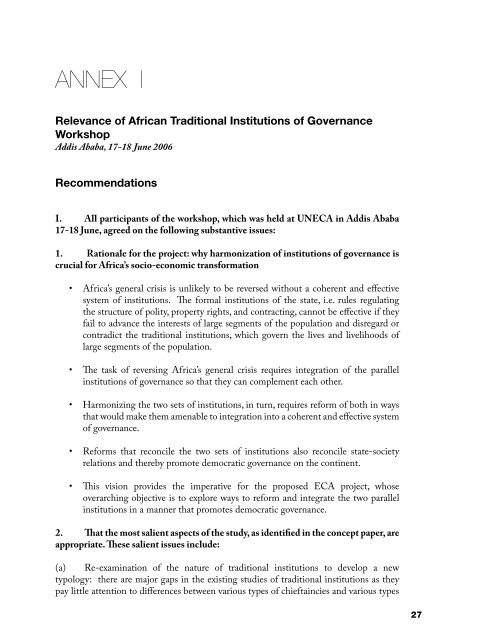Relevance of - United Nations Economic Commission for Africa
Relevance of - United Nations Economic Commission for Africa
Relevance of - United Nations Economic Commission for Africa
Create successful ePaper yourself
Turn your PDF publications into a flip-book with our unique Google optimized e-Paper software.
ANNEX I<br />
<strong>Relevance</strong> <strong>of</strong> <strong>Africa</strong>n Traditional Institutions <strong>of</strong> Governance<br />
Workshop<br />
Addis Ababa, 17-18 June 2006<br />
Recommendations<br />
I. All participants <strong>of</strong> the workshop, which was held at UNECA in Addis Ababa<br />
17-18 June, agreed on the following substantive issues:<br />
1. Rationale <strong>for</strong> the project: why harmonization <strong>of</strong> institutions <strong>of</strong> governance is<br />
crucial <strong>for</strong> <strong>Africa</strong>’s socio-economic trans<strong>for</strong>mation<br />
• <strong>Africa</strong>’s general crisis is unlikely to be reversed without a coherent and effective<br />
system <strong>of</strong> institutions. The <strong>for</strong>mal institutions <strong>of</strong> the state, i.e. rules regulating<br />
the structure <strong>of</strong> polity, property rights, and contracting, cannot be effective if they<br />
fail to advance the interests <strong>of</strong> large segments <strong>of</strong> the population and disregard or<br />
contradict the traditional institutions, which govern the lives and livelihoods <strong>of</strong><br />
large segments <strong>of</strong> the population.<br />
• The task <strong>of</strong> reversing <strong>Africa</strong>’s general crisis requires integration <strong>of</strong> the parallel<br />
institutions <strong>of</strong> governance so that they can complement each other.<br />
• Harmonizing the two sets <strong>of</strong> institutions, in turn, requires re<strong>for</strong>m <strong>of</strong> both in ways<br />
that would make them amenable to integration into a coherent and effective system<br />
<strong>of</strong> governance.<br />
• Re<strong>for</strong>ms that reconcile the two sets <strong>of</strong> institutions also reconcile state-society<br />
relations and thereby promote democratic governance on the continent.<br />
• This vision provides the imperative <strong>for</strong> the proposed ECA project, whose<br />
overarching objective is to explore ways to re<strong>for</strong>m and integrate the two parallel<br />
institutions in a manner that promotes democratic governance.<br />
2. That the most salient aspects <strong>of</strong> the study, as identified in the concept paper, are<br />
appropriate. These salient issues include:<br />
(a) Re-examination <strong>of</strong> the nature <strong>of</strong> traditional institutions to develop a new<br />
typology: there are major gaps in the existing studies <strong>of</strong> traditional institutions as they<br />
pay little attention to differences between various types <strong>of</strong> chieftaincies and various types<br />
27
















